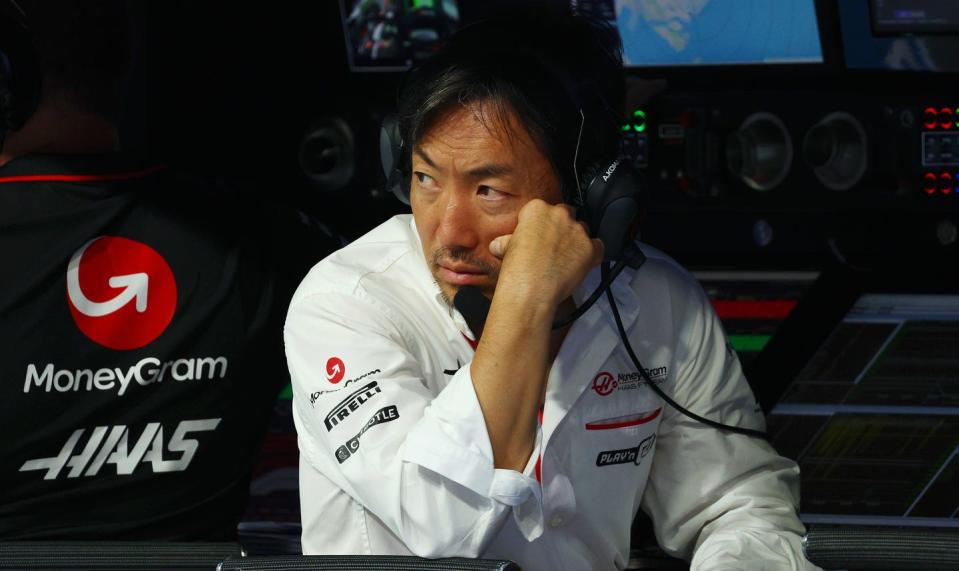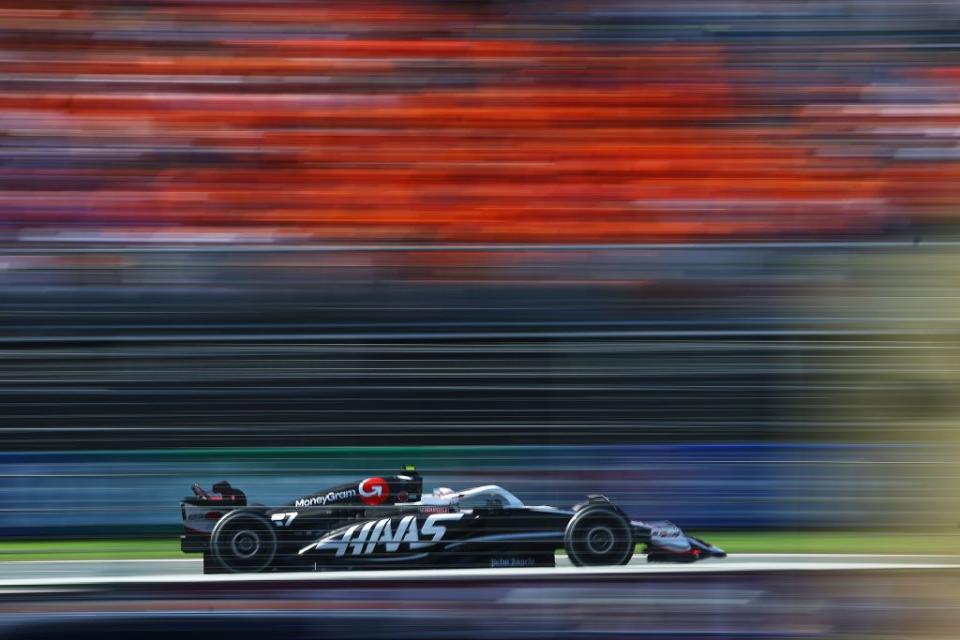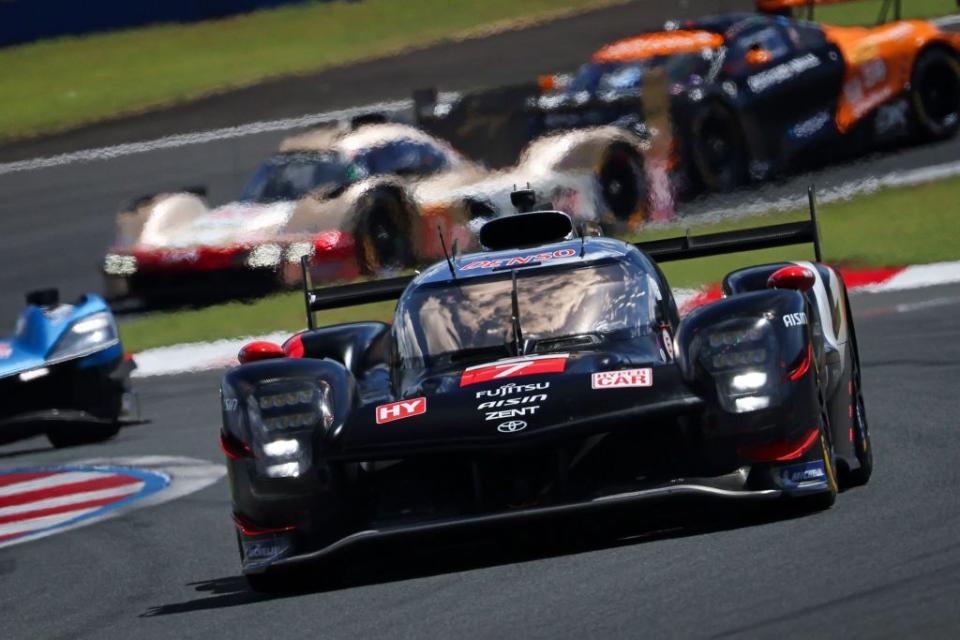-
Haas F1 has announced it is forming partnership with Toyota to improve its performance on the track.
-
The partnership will see both outfits sharing expertise and resources, with Toyota providing some design, technical, and manufacturing services to Haas.
-
The move will mark the return, of sorts, of Toyota to Formula 1, in which it last competed in 2009.
Haas has entered into a multi-year technical partnership with Toyota, as it strives to move up the Formula 1 grid.
The alliance was announced at Toyota’s Fuji Speedway circuit on Friday.
As part of the arrangement the parties will share expertise and resources, with Toyota providing some design, technical and manufacturing services to Haas, while they will collaborate on a young driver scheme.
Haas’ long-standing gearbox and engine partnership with Ferrari has already been confirmed through at least 2028, and this arrangement has not changed.
Toyota Gazoo Racing branding—the motorsport and R&D arm of Toyota—will appear on the Haas VF-24s from next weekend’s United States Grand Prix in Austin.
Haas aiming for the next step
Haas had a dismal 2023, finished last, and split from long-time team boss Guenther Steiner.
Ayao Komatsu was installed as team principal, and under his stewardship Haas has improved, with new lines of communication, particularly between its race team base in the UK and design office and aero department in Italy.


Haas has been strategically sharper and has developed well through 2024, and is seventh in the championship—ahead of Williams, Alpine, and Sauber—just three points behind RB, surpassing pre-season expectations.
But Haas is a minnow in Formula 1 parlance, in terms of personnel and infrastructure, meaning there is a ceiling to its potential without sizeable investment or structural changes.
Komatsu has been exploring options to elevate Haas to the next level, with Friday’s announcement the culmination of several months of talks between the companies.
“We are the smallest team on the grid,” Komatsu said. “We are lacking certain resources and hardware capabilities to understand certain things. In terms of being more competitive in the midfield, we’re looking for someone to give us more resource, and also have the hardware and knowhow to use that hardware—TGR gives exact that.
“They are looking for the latest F1 know-how skillset, which we have, but we don’t have their facilities, the number of people, their resource. So, that’s how we are tapping into each other’s expertise. It’s the perfect combination to have the mutual benefit.”
Team owner Gene Haas, who has been a more noticeable presence at grands prix this year, was fully onboard with the concept, according to Komatsu.
“Under the budget cap you’ve got to be cost efficient and you’ve got to be time efficient,” Komatsu explained. “All of this, with our current model, there’s a limit [how] we can improve on that. We have improved some areas, but unless we take some other aspects of engineering essentially in-house, which normally requires huge investment and big lead time, you cannot make a big step in terms of efficiency in both time and cost.
“With this partnership with TGR we can make that leap very quickly. So it’s a no brainer. And it wasn’t difficult to convince Gene. Gene’s very, very engaged with the F1 team. He’s always asking me, ‘Ayao, what do we need at the next stage to be better, to be top six, top five, consistently, to have a chance podium at some point, what do we need to do?’”
Komatsu pointed to simulator work as one area where Haas and TGR can collaborate and split resources, short-cutting its processes, and lead to mutual benefits.


He warned that the benefits “won’t be immediate” and that he “isn’t dreaming that it is suddenly going to take us a step straight away—that’s not going to happen—but what is going to happen is it’s certainly much quicker. Even if we can do it by ourselves if we had the money, it’s certainly much quicker to do it through this technical collaboration, because they’ve already got that knowhow, they’ve already got the people.
“I was looking for a way to speed up and say ‘how can we take this team forward in the shortest possible time?’ We cannot rush things too much. Although it’s a race, it’s Formula 1, so we are going to do things as quickly as possible, but there’s a fine balance. So we need to do it correctly.”
Komatsu stressed that its Toyota arrangement is in addition to its current longstanding Ferrari partnership, and deal with Dallara, and that the new affiliation received the blessing of the marque.
Haas will also continue to use Ferrari’s wind tunnel.
“Our partnership with Toyota is not to replace our Ferrari partnership,” Komatsu said. “The Ferrari-Haas partnership is the foundation and it is always going to be foundation. What we have with Ferrari, what we get from Ferrari, is amazing. It’s the foundation of Haas F1 Team. But areas Toyota can help us is outside of that. We’ve been transparent with Ferrari management from the early stage of this discussions, and there is clear understanding of what engagement we have with TGR and how we will protect the IP of each company.”
Toyota back, but not back
Toyota competed in Formula 1 between 2002 and 2009 with its own fully fledged works team, while its Fuji Speedway circuit twice hosted the Japanese Grand Prix, in 2007 and 2008.
But Toyota peaked as an occasional podium finisher and midfield staple, as promises of lunging into front-running contention never materialized, despite a budget believed to be among the highest.
The global financial crisis of 2008-09 triggered Toyota’s Formula 1 exit, and instead it has competed successfully in the World Endurance Championship and World Rally Championship.


It has not had a total disconnect from the Formula 1 landscape; Toyota’s wind tunnel in Cologne has been used by Formula 1 teams, most notably McLaren, while its WEC racer Ryo Hirakawa is a reserve driver for McLaren and participates in its TPC [Testing of Previous Cars] program.
But the new arrangement with Haas gives Toyota a chance to profit from Formula 1 knowledge, without making a costly full-scale works or engine commitment, in a similar guise to the Sauber-Alfa Romeo partnership that ran from 2018 to 2023.
Toyota representatives were at pains to stress the emphasis of its partnership with Haas is to learn technically, while also investing in future Japanese talent.
It outlined it has no plans to enter a team or construct a power unit, while branding will be limited on Haas’ VF-24 and will not extend to any serious sponsorship or title partner deal.
TGR President Tomoya Takahashi said that “some might jump to the conclusion: “Toyota is back in F1!” But that’s not the case.”
Chairman Akio Toyoda reiterated his decision in 2009 to withdraw Toyota from F1 on business grounds “was not wrong” but that “ordinary older car-loving guy Akio Toyoda had always regretted having blocked – by pulling out of F1 – Japanese youths’ path toward driving the world’s fastest cars.”
Consequently a key component of the partnership will be in providing test opportunities to Toyota’s Japanese drivers in old-spec Haas machinery, which would be the first TPC project for Haas.
“Through this partnership, we believe it would be fantastic if we could develop drivers who can secure regular seats in F1 in the future,” Takahashi said.
This would also lead the benefits on both sides, beyond just the driving element.
“TPC is very important in terms of training personnel,” Komatsu said. “We have just over 300 people, we have no contingency in personnel. Let’s say if a race engineer, or performance engineer decides to leave or has a program not to attend a race, then we are really struggling [to replace them], as we on the limit all the time, and in order to improve the organisation you cannot [have] that kind of survival stage as a baseline, we’ve got to build up our organisation, so through TPC we can start training our engineers, our mechanics, and having back-up people there.”
